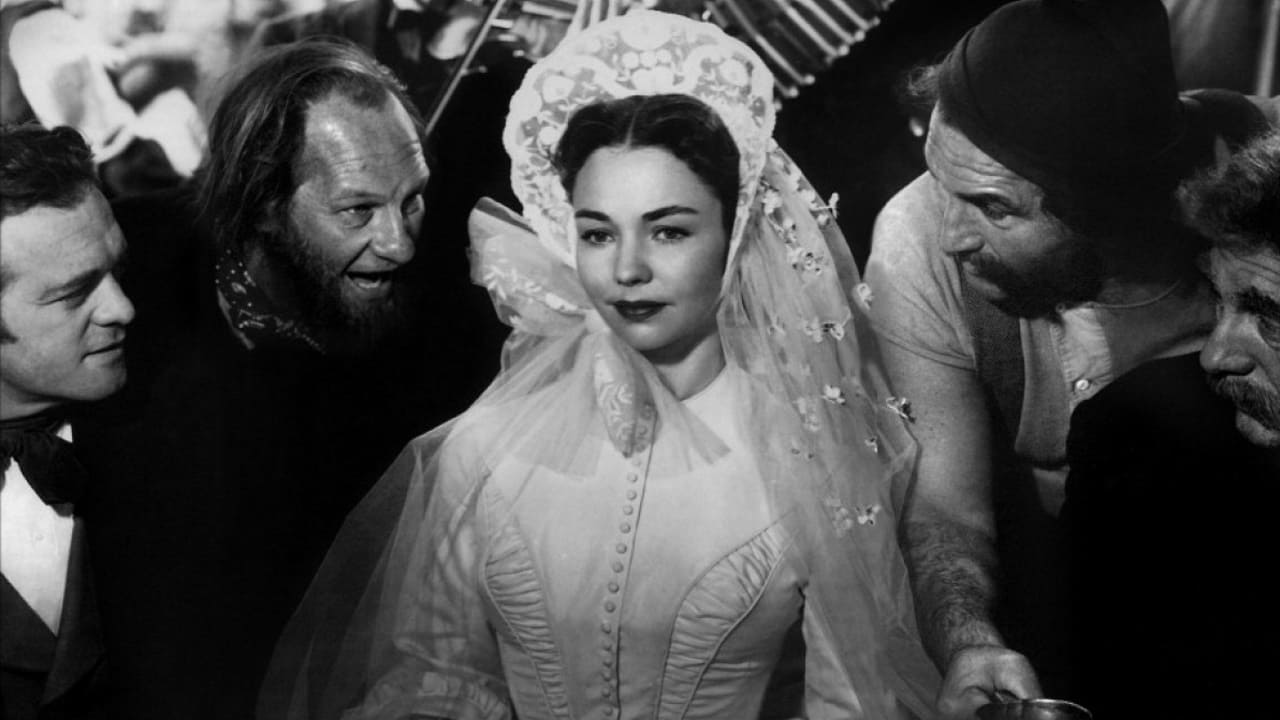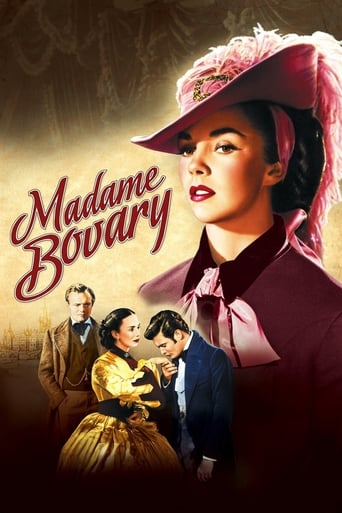

It's no definitive masterpiece but it's damn close.
... View MoreBrilliant and touching
... View MoreThis movie was so-so. It had it's moments, but wasn't the greatest.
... View MoreClose shines in drama with strong language, adult themes.
... View MoreJames Mason portrays author Gustave Flaubert on trial for his writing of Madame Bovary, on the charge of morality.Mason, in court, goes on to narrate the story of a woman, well played by Jennifer Jones, who grows up wanting more of life. Frustrated as she is, she seeks status while marrying Van Heflin, the country doctor. Her ability to succumb to ill-fated romances as well as running up debts leads to her inevitable downfall.As one of her lovers, Boulanger, Louis Jourdan forsakes his French accent. As the mother of one of her suitors, a failed clerk to an attorney, Gladys Cooper was able to reunite with Jones six years later after her memorable turn as the mean nun who make life so miserable for Jones in "The Song of Bernadette."We see beyond Mme. Bovary's imperfections to an imperfect world led by those who would destroy others for debts incurred.
... View MoreI'm a big fan of Vincent Minnelli's films and had saved this one for a rainy day and the pleasure seeing another take on a book I thoroughly enjoyed. I lived in France for many years and could imagine a Norman village within striking distance of Rouen. The village looks like something from Disneyland and the "French" characters as French as fries at McDonald's. I would have to admit that Jennifer Jones is gorgeous to look at but even her beauty can't rescue this Hollywoodized attempt at Kulcha". The scene at the dance was entirely too long and drawn out and the mirrors throughout the film were forced and contrived. Of course, the criticism of Emma's behavior were necessary to please the censors but the film turns into a diatribe against her morals that reaches American Puritanical hysteria. Those of us who read the book in its original language can vouch for the fact the Mme Bovary's village was claustrophobic and the people could be crude - not as crude as in the film where their crudity reached the absurd. We wouldn't think for a moment about changing Thomas Hardy's novels to fit the code, but both he and Flaubert showed their countries as they really were, without the embellishment of prettifying or laundering. What a disappointment,helas...Curtis Stotlar
... View MoreA treatment that was actually faithful to the novel--a cynical look at social climbing in the petit bourgeois French--wouldn't make Jennifer Jones look lovely and sympathetic, and Heaven knows, the beautiful young star must have a halo. So Emma is portrayed as a hopeless romantic, understandably in love with pretty things, who tries to love her husband, actually wants a child (the novel's heroine was indifferent to children), and generally tries her best to be good, but is betrayed by her own passions. She is redeemed as she dies (beautifully, of course). Van Heflin is a much more articulate and intelligent Charles than the clunking doofus Flaubert created, and Rodolphe was thick-skinned and callous in a way that Hollywood would never permit Louis Jourdan to be. So this version would have satisfied as a forties chick flick, all costumes and heaving bosoms, but it really bears very little relation, except for a few script lines, to the harsh and brilliant novel. Such a cynical view of a woman in movies was really not possible at the time. The world is still waiting for the real cinematic Emma Bovary.
... View More"What you try and create," the director Vincente Minnelli once said, "is a little magic". Like Madame Bovary, Minnelli's crime, if he had one, was wanting things to be beautiful. Producer Pandro S. Berman knew what he was doing when he hired Minnelli to shoot this adaptation of Gustave Flaubert's classic novel. Classic-era Hollywood was saturated with stories of apparently selfish women who ruin the men in their life, but Madame Bovary differs in that it gets us to understand and sympathise with its tragic heroine, even drawing parallels to our own desire for escapism through literature or cinema. And in the 1940s few pictures were as escapist as those of Minnelli.When you look at a Minnelli picture, his visual style is all about framing and defining beauty, be it Judy Garland singing at her window, a spectacular Ziegfeld stage set or recreations of fin-de-siecle artworks. For him, exquisite imagery was not simply a gloss – it was an aesthetic ideal that was at the heart of cinema. Yet for this picture, he frames beauty within the dreariness of reality, for example showing Jennifer Jones gazing out of the window of her dingy attic room on a glorious summer's day. But what is significant is that no matter how desperate the circumstances get, no matter how dark or cramped the interiors become, Jones is always magnificently dressed, and there is always somewhere a window onto a better world. In other words, he doesn't allow us to lose respect for the character or her romantic idealism. The real world may let us down, Minnelli seems to be saying, but he won't allow the concept of beauty itself to be dragged through the mud.The trouble with this version of Madame Bovary – and this is something common to many book-to-film adaptations – is that it is extremely bitty and repetitive. Novels are after all intended to be picked up and put down, whereas motion pictures must be swallowed in a sitting. Minnelli's flowing style may be designed to keep the audience constantly engaged on a visual level, but story-wise it is less likely to hold our interest. The acting performances are not exceptional – at least not by the standards of Jones and Heflin, and in any case we are not really able to focus on them within Minnelli's technical sweep.What we have here then is an adaptation that fails to assemble coherently the bones of the plot, but captures the essence of Flaubert's work and exhorts us to sympathise with the protagonist. The picture opens with a historical scene in which the author, played by James Mason, defends his creation by defending its heroine. This introduction as much as states that it is not enough to read what Emma did; we must understand why she did it. In this respect, Minnelli's Madame Bovary is a success on its own terms.
... View More